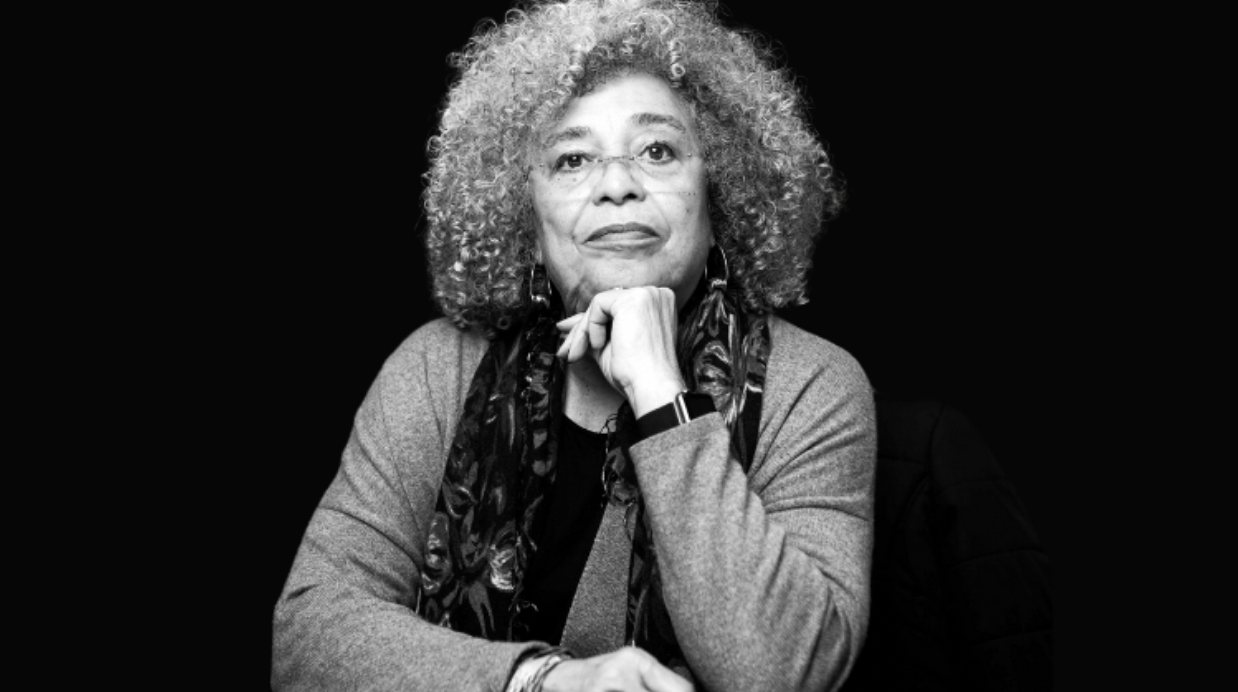
By Emma Loenicker
On Friday night, Feb. 21, Dr. Angela Davis empowered an audience with her courage and honesty, making the theater overflow with hope and a radical spirit. The Olympia Film Society event — Collective Struggle in Critical Times — was one of many stops on Dr. Davis’s public speaking tour. Like many Gen Zers, especially those who grew up in a liberal city, I first became aware of Dr. Davis’s career and legacy during an elementary school civil rights lesson. At 81, after decades of feminist political activism, grassroots resistance, anti-racist prison abolition advocacy and several distinguished teaching jobs, Dr. Davis is not done inspiring change. Among many historical narratives that she seeks to correct is that of the U.S.’s misrepresentation of the 1950-60s social movement that, while surely advocating for civil rights, was really about freedom. As she pointed out, the dispossessed must come to possess a certain degree of civil rights before embracing the fight for liberation: a hungry person isn’t seeking freedom before food. Following this logic, the U.S. civil rights movement was a foundational part of the ongoing Black liberation fight; a fight Dr. Davis’s vision is central to.
Dr. Davis was in conversation with Gilda Sheppard and Ranna, both of whom are educators by trade. Gilda Sheppard is a filmmaker and faculty emerita at Evergreen State College Tacoma who taught in Washington prisons for years and is among the founders of Freedom Education Project for Puget Sound (FEPPS). Ranna is a primary school teacher, a member of the Palestinian diaspora and an active participant in anti-imperialist and feminist grassroots initiatives. Together, these three women shared insights about building hope in critical times, touching on feminist intersectionality, the prison industrial complex, international solidarity, the importance of critical questioning and much more. At a time when DEI and identity-based programs are under imminent threat by the Trump administration, Sheppard, Ranna and Dr. Davis offered an empowering reminder not to forget the value of diverse spaces and the role our solidarity plays in maintaining these spaces. The audience radiated a palpably appreciative energy for the diversity and passion that brought us together that night.
The first question Ranna posed to Dr. Davis was about the relevance of fascism in the current political moment. Whether one accepts the perspective that Trump reflects a fascist turn in U.S. politics, or chooses to err on the side of caution by using terms like populist and authoritarian, embracing constructive reflection and criticism of this destructive time is a form of resistance. Juxtaposed with the reckless bombardment of radical executive orders issued and hateful ideas expressed by Trump in the past weeks, Dr. Davis’s compassionate radicality clarifies the difference between productive and destructive radical action. From comically denouncing the plastic water bottles on stage to sincerely remarking on the importance of altruistic solidarity, Dr. Davis demonstrated the power of living by Dr. King’s famous words: “Injustice anywhere is a threat to justice everywhere.” Dr. Davis’s compassionate radicality demonstrates the fundamental difference between positively reciprocal revolutionary action and negatively individualist revolutionary action.
Dr. Davis spoke with refreshing honesty about her lifelong journey of developing visions for overcoming injustice, revealing that it took her years to find power in her feminist voice and that her first exposure to the prison abolition movement was in prison herself. Those who cannot personally relate to the oppressive systems they are motivated to dismantle might struggle to envision where their solidarity and radical spirit can make a difference, but Dr. Davis suggests that unity in honor of difference is where power lies. The feminist movement, for example, has developed a greater capacity for radical action as Black feminism and transfeminism have weakened the traditionally white feminist movement’s assimilatory agenda that sought to deny the value of our differences. Dr. Davis has been outspoken about the danger of assimilatory solutions to socio-political issues. After all, our civil and personal duty is not to assimilate into systems we know to be unjust but to imagine solutions that break down the barriers of injustice. The point of freedom and liberation movements is not to integrate people into the structures of oppression, but rather, to revolutionize and transform these structures to free ourselves and each other.
As we bear witness to Trump’s reckless attempts to degrade institutions and relationships he feels threatened by, alongside the eager support enabling his antics, we must not misunderstand the growing power of extremist politics in our society. His populist campaign won the presidency because he addressed extreme struggles with radically vindictive solutions. But while Trump’s visions are inherently hateful and power-hungry, radical political visions don’t need to be destructive. Trump’s extremism is loud because it feeds on the powerlessness and fear that many feel. In the face of current political and economic anxiety, there is room to get louder with fiercely hopeful radicality. To stand a chance against Trump’s antagonistic, hate-oriented movement, the compassionate collective justice movement must respond to fear with radically hopeful solutions.
If there’s one thing that struck me most from Dr. Davis’s talk, it’s that revolutionary spirit is about production rather than destruction. Dr. Davis drew on W.E.B. DuBois’s insights from the Reconstruction era to explain that the Emancipation Proclamation was a positively destructive act, but void of generative intention. To be a prison abolitionist, then, is a choice between an anti-prison or pro-justice agenda. Neither justice nor freedom is achieved when we destroy without rebuilding. Revolutionary action is justice-producing when we are motivated by what we want to see created rather than what we want to see destroyed. Dr. Davis reminded everyone there on Friday that a loving, compassionate, radical, revolutionary spirit does exist — and that it’s a life-affirming act when we choose for it to be.
